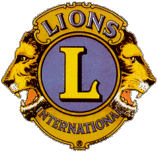The History
The International Association
of Lions Clubs began as the dream of Chicago businessman Melvin Jones. He believed that local business clubs should expand
their horizons from purely professional concerns to the betterment of their communities and the world at large.
Jones' own group, the Business Circle of Chicago, agreed. After contacting similar
groups around the country, an organizational meeting was held on June 7, 1917, at the LaSalle Hotel in Chicago. The new group
took the name of one of the groups invited, the "Association of Lions Clubs," and a national convention was held in Dallas
in October of that year. A constitution, by-laws, objects and code of ethics were approved.
Among the official objects adopted in those early years was one which read,
"No club shall hold out the financial betterment of its members as its object." This object has remained one of the association's
main tenets ever since.
Just three years after its formation, the organization became international
when the first club in Canada was established in 1920. Major international expansion continued as clubs were established,
particularly throughout Europe, Asia and Africa during the 1950s and 60s.
Perhaps the single event having the greatest impact on the association's service
commitment occurred in 1925 when Helen Keller addressed the Lions at their international convention in Cedar Point, Ohio USA.
It was there that she challenged Lions to become "knights of the blind in the crusade against darkness."
In 1990 Lions launched their most aggressive sight preservation effort to date,
SightFirst. The more than US$130 million-plus program strives to rid the world of preventable and reversible blindness by
closing the gap between existing health care services and those that remain desperately needed.
Broadening its role in international understanding, the association helped the
United Nations form the Non-Governmental Organizations sections in 1945, and continues to hold consultative status today.
Each year, during The Lions Day With The United Nations ceremonies, an award is presented to the grand prize winner of the
Lions International Peace Poster Contest.
Since those first years, the association has grown to include 1.4 million men
and women in more than 44,000 clubs located in approximately 185 countries and geographical areas.
The Name
The proper name of the association
is "The International Association of Lions Clubs." Many Lions, however, prefer the use of the shorter form of "Lions Clubs
International."
The Emblem
Throughout the world, Lions
are recognized by the emblem they wear on their lapels. It
consists of a gold letter "L" on a circular purple field. Bordering
this is a circular gold area with two lion profiles at either side facing away from the center. The word "Lions" appears at
the top, and "International" at the bottom. Symbolically, the lions face both past and future -- proud of the past and confident
of the future. Lions wear their emblem with pride.
The Motto
The motto of every Lion is
simply "We Serve." What better way to express the true mission of Lionism?
The Slogan
The slogan of the association
is "Liberty, Intelligence, Our Nation's Safety (LIONS).
The Official Colors
The royal colors
of purple and gold were selected as the official colors when the association was organized in 1917. Purple stands for loyalty
to friends and to one's self, and for integrity of mind and heart. Gold symbolizes sincerity of purpose, liberality in judgement,
purity in life and generosity in mind, heart and purpose toward humanity.
Leadership for the Future
Since 1917,
local Lions clubs have offered people just like you the opportunity to give something back to their communities. From involving
members in projects as local as cleaning up an area park or as far-reaching as bringing sight to the world's blind, Lions
clubs have always embraced those committed to building a brighter future for their community. The world has changed...and
so have we.
Today, with more than 1.4 million men and women members in more than 180 countries,
Lions have expanded their focus to help meet the ever-increasing needs of our global community.

